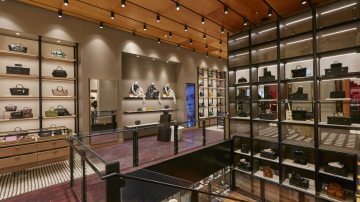This is an episode of the Glossy Fashion Podcast, which features candid conversations about how today’s trends are shaping the future of the fashion industry. More from the series →
Subscribe: Apple Podcasts | Stitcher | Google Play | Spotify
Since Reformation launched in 2009, it’s become well-known for its sustainability focus and wedding-perfect dresses. But, according to CEO Hali Borenstein, the company’s currently in growth mode and rapidly expanding its focus.
“The business has been doing well and evolving quickly,” Borenstein said on the latest Glossy Podcast. “We’ve accelerated growth, and we’re hiring like crazy. We need to make sure we have the right resources and great team members [in place] to support all of that growth.”
Reformation’s growth plan includes building upon its 25-store fleet. (“Retail has been a huge driver of our growth,” Borenstein said.) It’s also targeting new international markets. It recently established a team in the U.K., plus it has a team member in Canada. Europe is a key focus.
In addition, the company has been busy expanding to new categories. It launched activewear in March 2021 and shoes in May 2021.
“We are projecting very robust growth [for 2022], definitely far above 2019 levels,” she said. “We’ve been very focused on good, sustainable growth, while also maintaining profitability and a healthy business, so that we can invest in ourselves and propel our own growth.”
Below are additional highlights from the conversation, which have been lightly edited for clarity.
Ensuring inclusion in-house
“We start off with communication. Every other week, we have an all-hands [meeting]. [Plus] we have all-hands [meetings] in our factory and in our distribution center, and different communication channels for our retail team. We’re really trying to just amp up the communication. We move so quickly, and sometimes we just need to slow down and make sure everyone has alignment and that we’re on the same page. We’re doing a lot more listening sessions, as well, and have more opportunities for individuals to raise their hand and share feedback. So it’s not just a one-way communication path, but that two-way [path] is really critical. The second thing is training and investment into different opportunities. So we have a lot of DE&I work going on throughout the organization. It could be training, it could be celebration, it could be just making sure that all of our business practices — like recruiting, for example — are best in class. With DE&I, in particular, I’d say it’s not something where you just rip [off] the Band-Aid or check a box, right? It’s a long journey of work. And we are on that journey; we are very committed and putting in a lot of time there. Every day, we get better and better, and that’s the kind of progress I want to see. And then the last piece is just about making sure we have the learning and opportunities for growth. When you’re in such a fast-paced organization and growing so quickly, the team knows they’re on a winning team. But they also want to understand: How do I win with Reformation? And so it’s our responsibility as leaders to make sure that we make that path really clear and we provide the capabilities and the skill-building opportunities, so that every single person at Ref can feel like they can be on the winning path with us.”
Expanding to new product categories
“It takes us a while to get into a category, because if we wanted to just do it like anyone else, we could go quickly. But, given our sustainability principles, we have to really build a supply chain [from the] bottom-up. And so for shoes, for example, when we launched last year, we had been working on building the supply chain for almost a year. And, arguably, today, I’d say it’s the most sustainable dress shoe out there. But it took a lot of work for us to figure that out, from how we think about the material to how we think about the labor; there are so many components in a shoe. The same goes for when we launched active. We did not just take material that was out there, but we had to develop materials that really hit the standards that we were hoping for, from an impact point of view. And that was really challenging. So it takes us a bit longer and we go slower. But when we do it, we really want to be focused on making sure we never compromise our values.”
Fueling the customer community
“It’s important to have a very open, authentic dialogue with the customer. And we do that through so many different channels, whether it be social media, surveys, direct communication with our customer love team or our 25 stores. We take that feedback and we really integrate it into our decision-making. This is something internally that we’re actually really focused on for 2022: How do we take the customer voice and put it at the center of our decision-making, more so than before? So we have all these different, disaggregated touchpoints that we bring together, but then how do we make sure it’s the core driver of decision-making, so that we’re always evolving with our customer? This is something where DTC brands — because we own that direct feedback loop — have an advantage. It’s not just us producing something and telling customers, ‘This is what you should like.’ Now, they can tell us what they like, and we can be really responsive to their needs and what’s going on. That’s a muscle that we have and that we really need to keep making stronger and stronger as we go on.”




